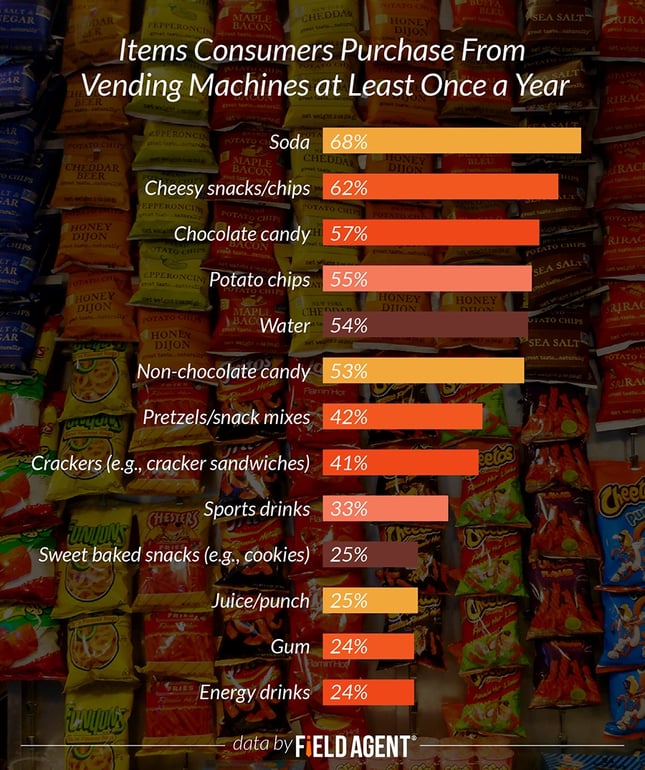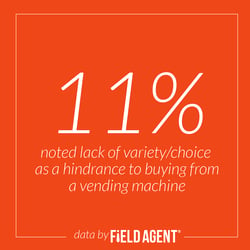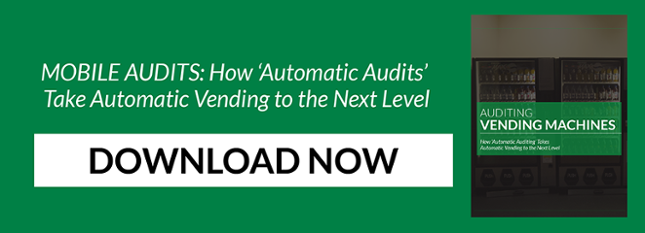Summary: For many across the country, trips to the vending machine are a common, perhaps even daily occurrence. We surveyed 500 Americans to understand consumers’ apprehensions toward using vending machines, and in this article we share 7 barriers to higher vending machine sales. So grab a snack (I recommend D7) and enjoy the read.
Vending machines have come a long way since 215 B.C., when the first device for automatically dispensing a product—holy water, actually—was designed in Egypt. Today, in addition to the customary snacks and beverages, vending machines distribute a wide array of merchandise, in just about every color: Red Boxes for movies, blue (Best Buy) boxes for on-the-go electronics, green (Coinstar) boxes for money-changing, and yellow boxes for gift card exchange.
According to the National Automatic Merchandising Association, the "full-line" vending machine industry rakes in anywhere from $19-28 billion per year.
We recently surveyed 500 consumers, split evenly between men and women, to understand usage and non-usage of vending machines. We set out to understand the reasons some Americans don’t use vending machines or, at least, don’t use them more regularly.
After briefly discussing vending machine usage rates, below we offer 7 barriers to higher vending machine sales.
What We Buy from Vending Machines
We presented respondents with 22 items one might commonly or occasionally find in U.S. vending machines. They were also given an opportunity to write in options not found among the choices. The survey asked respondents to identify all the items they purchase from vending machines at least once in a typical year.
Sodas took first place, with 68% of those surveyed saying they buy a soft drink from a vending machine at least once in an average year. Cheesy bagged chips/snacks (e.g., Doritos, Cheetos; 62%) and chocolate candy (57%) also fared well. Fresh and non-edible items—like salads (2%) and school/office/hygiene supplies (2%)—ranked toward the bottom of the survey.

How Frequently We Buy from Vending Machines
The survey further asked respondents to tell us how frequently they purchase different food/beverage categories from vending machines, including salty snacks, sweet snacks, carbonated beverages, and fresh foods.
47% of respondents said they purchase carbonated beverages (including sodas and energy drinks) from vending machines at least once a month. Compare this figure to sweet snacks (33%), salty snacks (31%), and fresh food (20%).
See also: Turn Your Vending Machine Into a Sales Machine
Not surprisingly, many more make purchases in these categories at least once a year: carbonated beverages (89%), sweet snacks (83%), salty snacks (81%), and fresh food (35%). Just over half (51%) said they’ve never purchased fresh food from a vending machine.
![Percentage of Consumers Who Purchase This Item From Vending Machines at Least Once a Month [GRAPH] Percentage of Consumers Who Purchase This Item From Vending Machines at Least Once a Month [GRAPH]](http://blog.fieldagent.net/hs-fs/hubfs/Campaigns/Vending/Vending_Snacking_2.png?width=645&name=Vending_Snacking_2.png)
Barriers to Higher Vending Machine Sales
The survey provided two different opportunities, (1) a structured, multiple-select question and (2) an unstructured, free form question, for respondents to relate the primary reasons they don’t use vending machines, or don’t use them more regularly.
Below are 7 barriers to higher vending machine sales that distinguished themselves to a greater or lesser degree in the findings:
1. Price
The cost of vending machine products was a clear barrier among many survey respondents. For the structured question, 57% selected “prices on foods/beverages are too expensive” as a reason they don't use vending machines more often.
On the free form question, which asked respondents to describe the primary reason they don’t use vending machines more frequently, approximately 56% of the nearly 500 remarks collected dealt in one way or another with the price/cost of vending items. “The prices are usually too expensive,” to quote one 33-year-old man from Fishers, IN. “I would rather stop in a store to get what I want for a better price.”
2. No Cash/Change On-Hand
At 57%, no other option ranked higher than “I never/rarely carry cash/change” on our structured, multiple-select question. This impediment, lack of cash/change, was also fairly well represented on the free form question, accounting for about 10% of comments. As one 28-year-old female from Norton, MA remarked, “I almost never have cash or change on me and most vending machines don’t accept debit/credit cards.” Which leads to the next barrier…
3. Many Machines Don’t Accept Credit/Debit Cards
Related to the previous point, for the stuctured question, “many machines do not accept credit/debit cards” was identified by 41% of respondents as an important reason they don’t use vending machines more regularly. For those machines that do accept credit/debit cards, 15% in the survey said they are deterred by fees from using these machines.
4. Too Few Healthy Choices
This 33-year-old man from Amite, LA captured an apprehension among several respondents when he said, “Most vending options aren’t very healthy. Over this past year I have become more aware of what I put in my body.” For the structured question, 37% identified “too few (or no) healthy food/beverage options” as a barrier. Additionally, around 27% of free from responses touched on the nutrition/quality of choices.

5. Inconveniently Located
Many agents also expressed that vending machines simply are not where they are. As one 45-year-old woman from McColl, SC related, “I rarely have an opportunity to use a vending machine. I am rarely in a place where vending machines are available.” 32% identified “not conveniently located” as a barrier on the structured question, and about 20% of free from comments cited it as a primary reason for not using vending machines.
See also: The #1 Reason Shoppers Don't Use Self-Checkout? 500 Women Surveyed
6. Malfunctioning Machines
Among free form responses, a 39-year-old woman from Queen Creek, AZ flatly said, “They don’t work properly,” summing up the sentiment of a smaller but still meaningful number of respondents. About a quarter of the sample, 23%, cited “machines often do not work properly” as a usage barrier on the structured question.
7. Variety/Choice
 Though there was some overlap between this point and the point about healthy options, this last reservation stood largely on its own in the results. Approximately 11% of free form responses noted lack of variety/choice as a hindrance to vending machine sales.
Though there was some overlap between this point and the point about healthy options, this last reservation stood largely on its own in the results. Approximately 11% of free form responses noted lack of variety/choice as a hindrance to vending machine sales.
As a 29-year-old woman from Concord, NH said, “I do not use vending machines often because the machines often lack variety.” Some suggested or implied changing the food/beverage selection more regularly. Variety/choice was not offered as an option on the structured question.


![Where Consumers Regularly Buy Snack Foods and Beverages [GRAPH] Where Consumers Regularly Buy Snack Foods and Beverages [GRAPH]](http://blog.fieldagent.net/hs-fs/hubfs/Campaigns/Vending/Vending_Snacking_3.png?width=646&name=Vending_Snacking_3.png)

